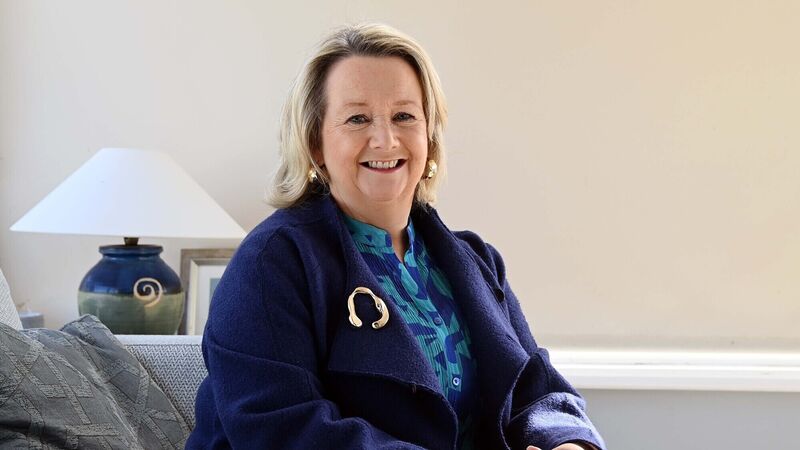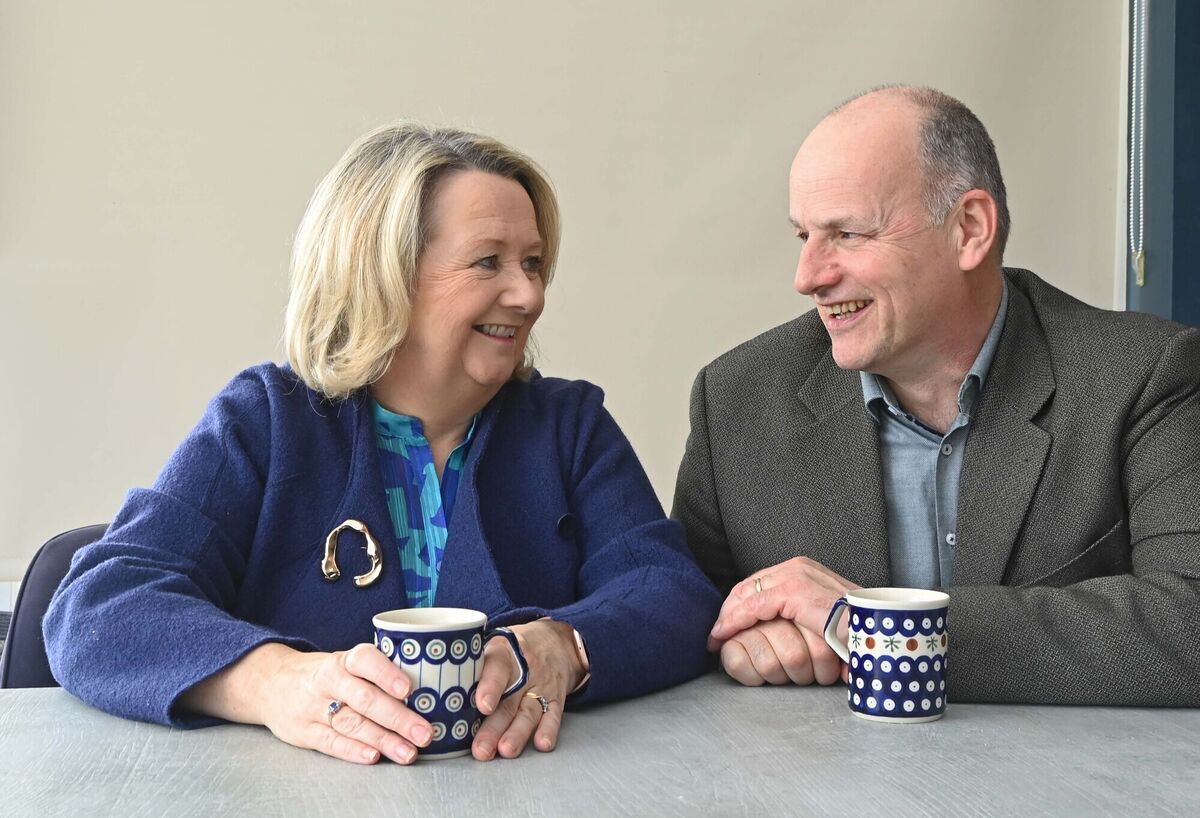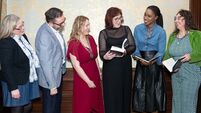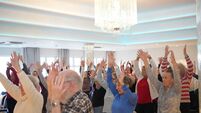Cork woman hosts support group for those impacted by grief during pandemic

Eileen McDonald, bereavement therapist.
LIKE so many of us, Eileen McDonald, from Killeagh, has had to come to terms with grief after losing a loved one.
“My interest began in the whole area of loss and bereavement when Denis and I lost our daughter, Ainé, aged eight and a half months, on July 14, 2004,” says Eileen, who is mum to Cian, 22, Ella Rose, 16, and Dara, 15.

Ainé was born with multiple birth defects.
“Her death prompted me to revisit education,” says Eileen, who is preparing to facilitate a supportive adult group, on the impact of the pandemic on your grieving process, from April 20 to May 4. She will be assisted by her husband Denis.
Ainé is always close to their hearts.
“Ainé was beautiful and we fell in love with her as you would with any of your children. However she did not thrive, and she died suddenly after a short stay in hospital.

“Ainé’s death was a real shock to our families and to us,” says Eileen.
“The grieving process is about reconstructing a life of meaning after a traumatic loss. The first shock came when she was delivered. After taking her first breath it was noticed there was a cavity in her chest. It was discovered that Ainé had an under-developed right lung, missing ribs, a curvature of the spine, one kidney, and skin webbing. She was diagnosed in Crumlin with Kipple-Feil Syndrome.
“We were told to bring her home from Crumlin and enjoy her; she would need medical intervention in the future and could live life with her physical challenges.
“Following her death, we were thrown into shock and grief. We had no medical, spiritual, or emotional preparation for Aine’s death.”
Eileen also lost her dad, Pat, aged 82, during the pandemic, in March, 2021.
“Even though dad’s death was an anticipated loss, it was gradual, we were never fully prepared for the final loss,” says Eileen, who completed her training in Counselling and Psychotherapy with MTU, formally CIT. She has specialised in working in Loss and Bereavement with a Masters in Loss and Bereavement with the College of Surgeons in Ireland and the Irish Hospice Foundation (2020-2021).
Eileen is well qualified to facilitate a supportive group on ‘the impact of the pandemic on your grieving process’.
“I trained in Group Facilitation Skills with Cork Social and Health Education Project, (2007-2010). Furthermore, I have many years of experience in Pieta, dealing with traumatic grief, death by suicide. I work in private practice, www.counsellingconnects.com and have personal experiences of grief.”
Eileen got on with her life despite her grief.
“I went on to complete a Masters in Loss and Bereavement,” she says. “Taking on the Masters forced me to look at loss and bereavement and reflect on it. Going through the grief process is normal. Grief is universal,” says Eileen.

While Covid was raging throughout the world, and restrictions were in place, things were very difficult for people.
“The nursing home where dad was, was closed to visitors for much of the time,” says Eileen. “We could not visit our dad in the normal way for a year before he died. It was difficult to communicate with him anyway because of the masks, visors, and screens in place due to the restrictions during Covid. In addition, dad had Alzheimer’s.”
The family had some consolation during the sad time in their lives.
“Because dad didn’t die from Covid, we were able to go into the nursing home a week before he died and say our goodbyes,” says Eileen. “Going in to see him, we had to wear protective gear.”
Pat had his loved ones around him.
“We were able to talk to him, touch him, and sing to him,” says Eileen. “Together with my siblings, we reflected on memories. We were together as a family.
“We had lost mum to cancer in 2013. Before dad went into a nursing home because of advanced dementia, my sister Geraldine, minded him at home for five years with family support.”
Saying goodbye to a loved one is important.
“We were lucky we got to say goodbye to dad,” says Eileen.
“Being able to acknowledge the reality of the loss of a person is important. However, this takes time and is a unique process for everyone.”
Pat, 82, got a good send off considering the difficult circumstances during Covid. “Ten people were allowed at his funeral,” says Eileen.
“The service was live-streamed and his family, friends and neighbours lined the road, adhering to restrictions, and everyone acknowledged dad’s death on RIP.ie.”
Many people in Ireland found themselves in a difficult position during Covid when they couldn’t visit loved ones in hospital or in care homes.
Eileen tells me about the course she is facilitating, which Youghal Community Health Project funds.
“This free course is for adults who lost a loved one during the pandemic, either through Covid-19 or not,” says Eileen.
“It is opened to everyone who is interested, and it specifically targets the East Cork / West Waterford area.
“The course is for people who may be stuck in unresolved grief because of circumstances during the pandemic,” says Eileen.
“People participating in the course can openly talk about their loss during the pandemic. It will provide an opportunity for participants to explore through the safety of the group the impact of the pandemic on their grieving process.
“The pandemic raised complications for people who couldn’t be with their loved ones. Opportunities were missed and so were connections with family and friends. There can often be a sense of unrealness about the whole thing.”
Dealing with grief is difficult at the best of times.
“The pandemic and lockdown restrictions meant those bereaved could not avail of the usual community and family support, funeral and death rituals,” says Eileen.

“Physical and travel restrictions for some meant being unable to be with a loved one who was dying, not able to visit hospitals, wearing masks, or protective gear, being unable to attend funerals, express grief, talk to others about a loved one or share memories after losing a loved one.”
Saying goodbye to a loved one is very important.
“Being unable to say goodbye to a loved one can leave the bereaved with no closure, and incomplete grieving can lead to guilt, anger, depression and isolation,” Eileen adds.
“Rituals play a crucial part in helping us go through the journey of grieving, and without them, we can feel adrift, angry, guilty, empty and sad.”
The course will provide a platform for participants to share their personal experiences of loss during the pandemic.
“We will look at the grief process, the tasks of mourning, meaning-making, dual process and continued bonds,” explains Eileen.
“First, we will introduce journal writing and grief monitoring exercises. Second, we will explore meaning-making using a creative exercise called broken pieces to explore shattered assumptions and expectations. Third, we will introduce simple, rewarding activities to cope with the pain of loss actively.”
Grief can take many forms.
“Finally, we will look at grief that gets stuck and derailed, called prolonged grief,” says Eileen.
A comforting cuppa will be available for participants taking part in the loss/bereavement course.
“There will be space to hear each other, cry, learn, have a tea-break and a laugh at times!”
Can people heal from their grief?
“People can heal from their grief, but life is forever changed,” says Eileen. “Grief is a universal experience. The small losses prepare us for the more significant losses. Part of grief is the continued bond with a loved one; their legacy and the meaning of their life.
“We grieve to remember, not to forget,” says Eileen.
“Grief itself brings us to that place. Grief is individual to each person based on many factors. There are no stages; no time element. It ebbs and flows. It’s messy.”
The loss and bereavement course will offer an opportunity to reflect and remember.
“It’ll be in a relaxed atmosphere,” says Eileen. “We will create an environment of safety and trust together. Youghal Community Health Project funds the participants.”
The support group will meet from 7pm to 9pm on Thursdays, April 20 to May 25, 7 - 9 pm, at Youghal Community Health Project, P36 YE98. To sign up contact Eileen McDonald on 086-3334824 or email eileencounselling@gmail.com







 App?
App?


